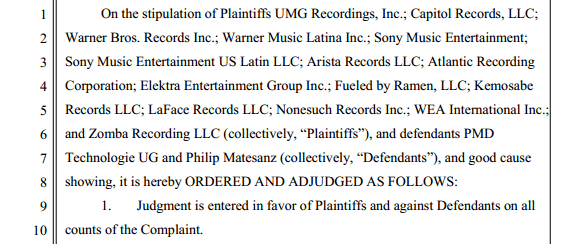The rightholders achieved the closure of the YouTube-MP3 converter service
 Previously, media converters of various kinds existed only in the form of applications under Windows / Linux. Over time, services began to appear on the Web, the functionality of which was similar to programs of this kind. One of them is the YouTube-MP3 site. Its attendance is several million people a day, so the service is one of the most popular in the world.
Previously, media converters of various kinds existed only in the form of applications under Windows / Linux. Over time, services began to appear on the Web, the functionality of which was similar to programs of this kind. One of them is the YouTube-MP3 site. Its attendance is several million people a day, so the service is one of the most popular in the world.YouTube-MP3 specializes in converting audio tracks in YouTube clips to mp3 files. This is quite convenient - after all, you can get music in good quality without worries and without searching for resources where you can download an mp3 file. After that, the music can be downloaded either to the player, PC hard disk, or to the cloud storage. Unfortunately, the other day the site announced the termination of work as a result of pressure from the owners.
According to music labels, converting audio tracks from video to mp3 seriously reduces the income of such companies. Well, it is clear that once the right holders lose money (or think they lose), they will do everything to remove the obstacle in the way of money to a bank account.
The service administration in question received a lawsuit from the RIAA, an organization representing the interests of the recording industry. The plaintiff told the court that the site operators are conducting illegal activities, violating several articles of the copyright law. In addition, this site, in the opinion of the copyright holders, allows users to bypass Youtube protection mechanisms (against pirates), which is another violation of the Digital Millennium Copyright Act ( DMCA ).
')
Also, the RIAA accuses the site operators that they receive additional income from advertising. The lawsuit, in particular, states the following: “With the promise of free music, the defendants attracted millions of users to their website, which made it possible to earn revenues from advertising as well.” The lawsuit was filed last year, and now the parties have agreed on a pre-trial settlement.
Unfortunately, the details of the agreement are not available to the public, they have not been made publicly available. However, it became known that the pre-trial agreement is beneficial to the plaintiff. Moreover, the creator of the service, Philip Mathesants, agreed to pay the plaintiff a certain amount of money.

The site owners have lost the right to use the technology of converting audio stream to MP3. If the work of the service will continue in one form or another, it can be a big trouble for the operators of the site. The YouTube-MP3 itself will be closed in the near future, and the domain of the resource will be transferred to the record label representatives. “Defendants are obliged to transfer the domain name www.youtube-mp3.org to the plaintiff as part of the pre-trial agreement concluded by the parties,” the document says.
The judge has yet to sign an agreement, but the fact that the service will stop working (he already does not convert anything, giving out a message about a technical problem) is beyond doubt. In principle, such services - more than a dozen, so that users can work with other similar resources. But how long can other services with similar functionality last? Time will tell.
In general, all this is minor compared to what rights holders are doing in the United States. Here, the RIAA, together with 14 partners, are trying to force providers to filter pirated content. That is, fighters against pirates do not want to spend time searching for "counterfeit" content, but they want to entrust the responsibility for blocking pirated content, including music, video, etc. on providers. According to the RIAA, the process of removing content on demand takes too much time.
Last year, the association proposed to establish a clear time frame during which the owner of the site on which the controversial information is located must remove it. If the resource operators have not done anything in due time, then providers are already entering the game. Actually, the mechanism is very similar to the one that Roskomnadzor now uses: a global blacklist of sites, blocking resources, etc.
Source: https://habr.com/ru/post/357844/
All Articles